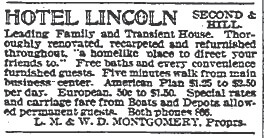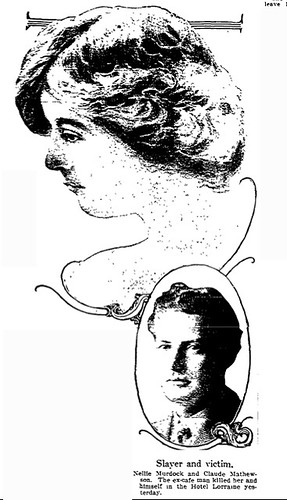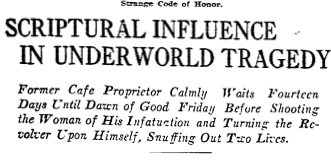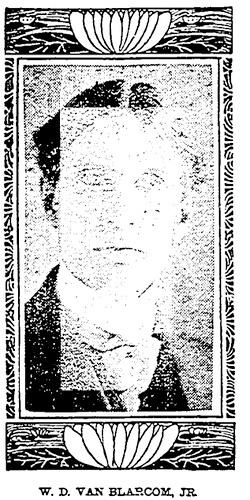Location: 209 South Hill
Date: July 1905

W.D. Montgomery and his stepdaughter, Mary Meister, arrived in
W.D. had never been a teetotaler, but once in
Laura tried to persuade W.D. to attend one of Francis Murphy”™s temperance meetings and take a sobriety pledge. W.D. wanted nothing to do with Francis Murphy or sobriety, and in a fit of rage at his wife”™s suggestion, he smacked her.

Everyone who came into contact with the couple thought that W.D. was nothing better than drunken brute, particularly when in full view of several hotel guests he chased Laura through the hotel, then grabbed her by the throat and throttled her. Although W.D.”™s drinking and behavior had certainly spiraled out of control, he may have had good reason for behaving so badly. He”™d become convinced that Laura was being unfaithful and had started following her. He trailed her several times to an obvious assignation in
By July 1905, Laura had run off with the railroad man with whom she had been having an affair. The hotel had been sold to Mrs. Belle McWilliams, and W.D. and Mary were running it while the deal was being finalized.

Suddenly, Mary came forward with shocking allegations against W.D. She said that he had ruined her (early 1900s doublespeak for seduced), and that he had been going around town telling anyone who would listen that he was in love with her. One day at the corner of First and Broadway, W.D. began to shout at his stepdaughter, saying that if she turned her back on him he would kill her and then himself.
It was his downtown outburst that compelled Mary to have her stepfather arrested on a charge of insanity. The two appeared in court to try to settle the unholy domestic mess. Mary broke down on the witness stand and began to sob. All eyes were on her as she turned to W.D. and said “You have ruined my reputation, and now I don”™t know what to do”. W.D. Montgomery looked astonished. “I didn”™t do anything of the sort” he replied, “I would marry you tomorrow”. Then W.D. went on to shock the courtroom further by saying “I thank God that the railroad man ran away with my wife”, adding, “I didn”™t love her and she knew it”.
By the time Mary and W.D. were finished testifying, the spectators were left wondering what exactly had been going on at the Hotel Lincoln, especially before Laura arrived to join W.D. and Mary in 1904. Could they have been having a relationship then? Was that the reason Laura had become involved with the railroad man? Mary was tight lipped, but wouldn”™t deny that she and W.D. had been engaged to wed! Meanwhile, W.D. continued ranting and raving in court, and finally had to be taken to the
With Mary embarrassed to be seen in public and W.D. babbling away in the  have ended there ”“ but one more bizarre chapter remained to be written.
have ended there ”“ but one more bizarre chapter remained to be written.
Someone contacted police, telling them that the reason W.D. Montgomery”™s behavior had been so erratic was because he had been drugged by a person (or persons) who wished to gain control of his property! The former hotel owner had been deeply in debt when he sold the
Then, one night in early July, W.D. crept down to the safe and made a hasty $1100 withdrawal. He was discovered later in the gutter – drunk, disheveled and penniless. Shortly thereafter, bankruptcy proceedings would be instituted against him.
A bankruptcy hearing would be held, and the judge would hear varying accounts of the deal to purchase the Hotel Lincoln. According to Mrs. McWilliams, she”™d been given a bill of sale by W.D. in the amount of $8000, but she would actually pay only $6900 for the hotel. That shady little sleight of hand was intended to defraud W.D.”™s creditors to the tune of $1100. Belle told the court that she wasn”™t wild about the plan, but she”™d gone along with it because W.D. owed her money.
Sadly, there would be no further reports of W.D.”™s colorful exploits in the Los Angeles Times.







